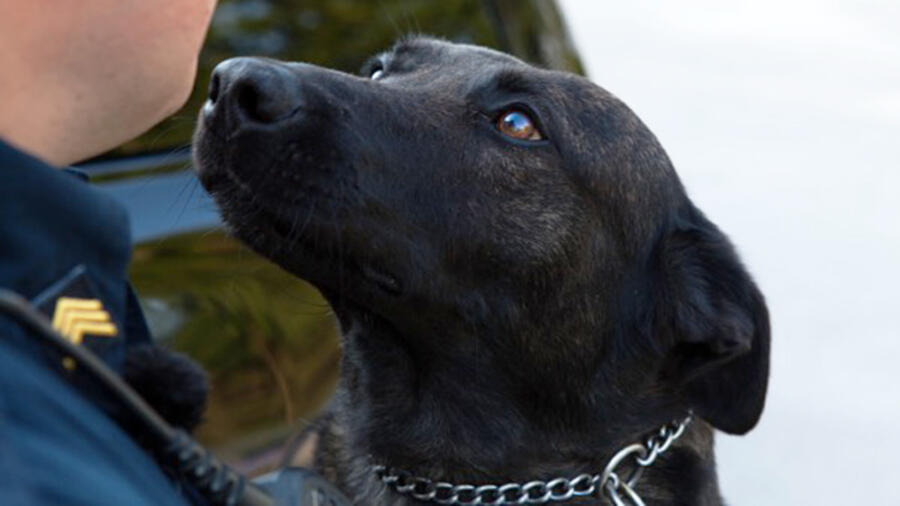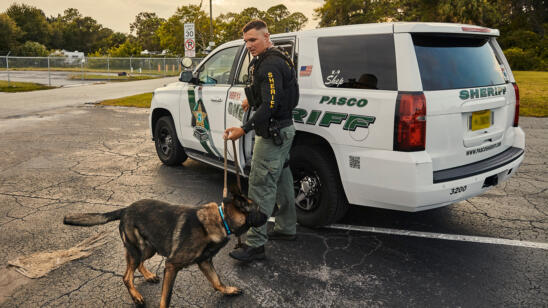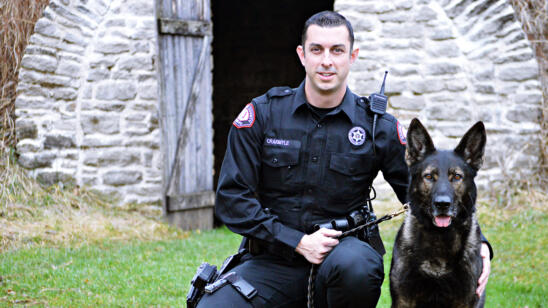Meet the man behind some of Live PD’s popular K-9s: Master Trainer Lt. Glenn Jackson. Hailing from the Jeffersonville Police Department in Indiana, he trains fan-favorite police dogs Flex and Cairo along with their human partners.
Jackson joined the department in 1998 and, after working in K-9, became a master trainer in 2008 through the North American Police Work Dog Association (NAPWDA). He spoke with A&E True Crime about what he looks for in bringing in new police dogs, the relationship between K-9s and their partners and a funny challenge he had with training Cairo.
Your background was law enforcement and then you went into the dog training. It doesn’t work the other way around?
It didn’t for me. I’m not saying that it can’t for others. If they had done anything with dogs prior to [becoming an officer] and then got hired, I’m sure that it could work the other way. Typically, you don’t get a chance to work a dog at a police department until you’ve at least been an officer for a couple of years. You need to become a good police officer before we can throw a dog into that mix.
Do you go out on patrol like other officers or do you train dogs as your full-time job?
I wish training was my full time job. I’m actually the third-shift commander. My K-9 Cinco and I patrol. Susan Woodard and her dog Blitz are on my squad. At night, typically one or both of us are out.
Are you responsible for finding new police dogs?
Yes. We go through vendors. The vendor we use the most, but not exclusively, is called FMK9 in Elkhart, Indiana. That company goes to Europe to a brokerage house where all the dogs are. Some of them have their own specific breeders that they may go to. They do tests on the dogs, and then bring the dogs back. Then I go to the vendors, look at the dogs and do tests on them. Then I make the selection.
What are you looking for in a potentially good police dog?
I’m typically looking for a dog that has a phenomenal hunt drive. That is what our dogs do the most—whether it be for narcotics, explosives, bad guys. It’s a hunt.
I’m also looking for a dog that’s social. There was a time in K-9 when the mentality was a little more ‘let’s get a junkyard-type dog that’s going to bite everybody.’ We don’t look for that. I look for a dog that people can pet, but at the same time, when it’s time to go to work, he can be all business.
Are there certain breeds that are better than others for that?
Again, that gets into job specifics. If I want a really good scent-detection dog—it could be for narcotics, bombs, cadaver, explosives, whatever you’re looking for—-you’re probably going to get into more of a retriever, because they have such a high-hunt drive But I haven’t seen too many retrievers that, if we needed them to bite at the end, that want to bite people.
If I’m looking for a really good tracking dog, I’m going to get a bloodhound. But again, I haven’t seen too many bloodhounds that, at the end of the track if someone doesn’t give up and there’s a reason for an engagement, [actually] engage.
We use the shepherds for the most part. This can be a German shepherd, Dutch shepherd, Malinois, or a mixture of any of those, because of all the things that we need them to do, they [perform] average or above.
You mentioned a number of different kinds of tasks—cadaver searching, narcotic searching, being able to take down a suspect. At Jeffersonville, what exactly are you training the dogs for, a combination of all that or are some of them more specialized?
We have four dual-purpose narcotic-patrol dogs. Obviously they are trained to find drugs. They are trained to track and do an area search, like if someone is hiding in the woods. They do evidence search or article search, [when] something has been thrown down. They would locate [the item] for us. We do building searches with them. Obviously, we have to teach them obedience for what we need. We can even do some tactical deployments with them. And then I also have one that does explosives in the patrol.
Are Flex and Cairo part of that first group?
Yes.
So they wouldn’t be looking for explosives?
No. You don’t train a dog to find explosives and narcotics, because when they give you their finish [by sitting down when they find the item they’re trained to look for], is it a finish for a narcotic or is it a finish for a bomb? Obviously, we’re going to handle each one of those things differently.
What are some of the activities you might start out with when training one of your new dogs?
The first thing we do is the bonding period with the handler. The dog and the handler are going to become a team. We typically do a lot of things at the same time. We’ll do that bonding, but at the same time we’re already starting our obedience training. I will start to do imprinting, getting the dog to recognize an odor. I’ll start the imprinting of my explosive or whatever the scent detection that the dog’s going to be used for. I usually start tracking [training]. Then we go on from there.
Do you always train the dogs along with their human partners?
Yes.
Why do the K-9s live with their partners?
Typically, it is [because of] the bonding. Dogs have a natural instinct to be part of a pack. Even though this handler is not a dog, in this dog’s eyes, the handler is going to become that to them. You develop a pack bond with the animal.
The other thing is…it saves a whole lot of time. They call me and say, “I need a dog.” I don’t have to go to a kennel and get [my] dog. It’s right there at the house. Time can be an enemy on some of the things that we do with our dogs. So 10, 15, 20, 30 minutes can make a big difference. It’s also saving the handler some time on their days off—they’re not going someplace else to tend to their dog.
How often are you part of the training?
Through the state and through case law, the dogs are required to do 16 hours a month of basic training. I take care of all of that maintenance training. Then, when we get a new dog, I’m responsible for taking that dog and that handler from ‘green.’ Sometimes it can be an experienced handler and a green dog. Sometimes it can be a dog that we’ve trained and the handler has chosen to move on, but the dog’s not ready to retire so we transfer it to another handler. I’m responsible for getting them from that beginning [green] stage to a certification level.
What are some of the more advanced activities you might do with dogs that have already started bonding with their handlers and have some of the basics down?
When you get into the advanced training, you’re talking about tactical deployments with the SWAT-type teams. A lot of times, dogs have the mentality of a 7-year-old kid. So I put the dog and the handler into many scenario-based trainings so that [if] the dog and the handler… encounter a [scenario] on the street, it’s not the first time the dog has seen it.
What are the similarities and differences in training police dogs versus service dogs who help people with disabilities or PTSD?
I have never trained a dog for anything other than law enforcement. I don’t do civilian dog training. Typically, they want to treat their dogs more like a child than a dog. In law enforcement, we try to get to a one-command compliance, because of what we do.
Are there certain rules officers need to follow with their dogs? Last year on Live PD we saw Officer Alyssa Wright purposely not call out her K-9 Cairo during a domestic disturbance. Later she said it was because there was a dog in the area that could potentially attack him.
The rules that my handlers have for the most part on the deployment of the dog are going to be mainly based off of, first and foremost, law.
The other things basically boil down to common sense. In that case, if Aly would have deployed the dog, and instead of the dog being able to assist her, we end up with a dog fight, now not only is she fighting with a suspect but now she’s also worrying about what’s going to happen with her dog.
In this case, she made a very good common-sense [decision]. Is [the dog] the right tool? It’s no different than the other things she carries on her gun belt. In that case, choosing the dog probably would have caused her more problems than it would have solved.
What’s it like to train Cairo? Is he a good student?
Cairo learns well, he learns quickly. He turned out to be an escape artist. I spent many an hour when we first got this dog trying to repair kennels and fix them so that he couldn’t get out. It took us almost a year to get a kennel together that he could not escape from. I told Aly I think we should have named him Houdini instead of Cairo.
It’s so surprising, even after all the years I’ve done this, just how quickly the dog and the handler become the same in their personality. It’s really wild to watch that.
Do police dogs get automatically retired at a certain age? If not, when do you know it’s time to retire one?
The first sign of any type of a health issue is our cue to start looking for another dog. We try to get another dog, get it trained and ready so that the day it certifies and is ready for the street, is the retirement day for the [other] one. The dog that we have now for Ricky Ashabranner, K-9 Vali, is a new dog. We just got him on the street this year. His retired partner started showing some signs of hip dysplasia.
The dogs—even if they don’t show some health issues—may start to show that they don’t track quite as well as they used to, or certain things they used to do really well, they’re just not quite doing it to the standard they used to. That’s typically between eight and 10 years old for most of them.
Are there any fun or surprising stories you can tell us about some of the Live PD K-9s like Flex and Cairo?
There’s been very little that I’ve seen that has surprised me now with all the dogs I’ve trained. The thing with Flex is just how in tune he is with [Sgt.] Denver [Leverett]. When we get into our training group, I can let my dog out the door, off lead, with everybody standing around. He’ll go over and let them pet him. Then when I’m ready to go to work, I call him.
Flex is all about Denver. He’ll let somebody pet him, but the whole time he’s getting petted, he has his eye on Denver. He’s, ‘Where are you? Are you ready? What do you need me to do?’ So I think that’s one of the things about Flex. He just really is attuned to Leverett. They’ve got a tight bond, and they’re a very good team.
Related Features:
Live PD’s Sgt. Denver Leverett on His K-9 Partner Flex and the Unexpected Places People Stash Drugs
Interview with Live PD Officer Alyssa Wright on Taking Down Suspects—Two at a Time


